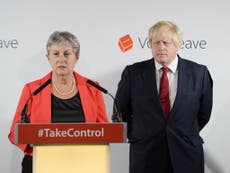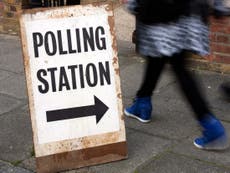Political donations escape ‘money laundering’ checks required to open bank account or give to charity, MPs told
‘People are going to be asked for identity to vote – yet no one’s asking for identity for those who are donating money to political parties’
Your support helps us to tell the story
From reproductive rights to climate change to Big Tech, The Independent is on the ground when the story is developing. Whether it's investigating the financials of Elon Musk's pro-Trump PAC or producing our latest documentary, 'The A Word', which shines a light on the American women fighting for reproductive rights, we know how important it is to parse out the facts from the messaging.
At such a critical moment in US history, we need reporters on the ground. Your donation allows us to keep sending journalists to speak to both sides of the story.
The Independent is trusted by Americans across the entire political spectrum. And unlike many other quality news outlets, we choose not to lock Americans out of our reporting and analysis with paywalls. We believe quality journalism should be available to everyone, paid for by those who can afford it.
Your support makes all the difference.Opening a bank account or giving to charity requires tougher checks than donating to a political party, an investigation into “dark money” has heard.
Charities must prove the cash they receive has not been laundered – yet parties receiving billions of pounds escape any such protections, a Commons committee was told.
Dr Alistair Clark, from Newcastle University, pointed out the security committee’s Russia report – which Boris Johnson suppressed in 2019 – had “pointed to Russians being able to do this”.
And ministers were now introducing tough ID laws in order to vote in elections, while failing to act on the “lax” checks on the huge sums flowing to parties.
“That seems to me to be a fairly big anomaly in the ability to donate money into the political system,” he told the public administration committee.
“There’s absolutely no reason why political parties shouldn’t be able to adopt those customer requirements, because we’ve all had to deal with these when we’ve opened a bank account, when we we’ve done something online.”
“And I see no reason why all parties shouldn’t have to apply those money laundering regulations as well.”
Dr Clark added: “People are going to be asked for identity to vote – yet no one’s really asking for identity for those who are donating money to political parties.”
The inquiry comes amid Conservative threats to overhaul – or abolish – the Electoral Commission which Amanda Milling, the Tory chairwoman, branded “not fit for purpose”.
The government has been accused of a revenge mission, after the watchdog punished Vote Leave for breaking electoral law during the Brexit referendum campaign.
Meanwhile, the prime minister was accused of giving the Kremlin the green light to meddle in UK politics, after dismissing many of the findings of the Russia report – after eventually releasing it.
But Dr Clark said the Commission’s powers needed to be strengthened, because – with fines capped at just £20,000 – campaigners “don’t see it as serious deterrent”.
“They can exploit loopholes in the law,” he warned, adding: “They will take a fine at the end of it, if they get found out.”
Dr Clark added: “The ISC [intelligence and security committee] Russia report pointed to Russian being able to do this.
“So the permissibility regime that we have is very much beyond its sell-by date. We really do need to be thinking about tightening up here.”
Professor Toby James, of the University of East Anglia, raised fears about the elections in May – postponed from last year – with decisions left to local authorities, amid the pandemic restrictions.
In Scotland, the Holyrood parliament enjoyed powers over day-to-day preparations, while in England and Wales “there is no central authority able to do that”.
“Is every polling station booked? Are they all in place?” he asked, adding: “We’ll see what happens in May.”






Join our commenting forum
Join thought-provoking conversations, follow other Independent readers and see their replies
Comments